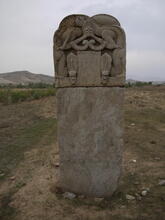Rise and Fall of Epigraphic Practices in Historical China
Tomoyasu Iiyama - Professor in the Faculty of Letters, Arts, and Sciences, Waseda University
This talk explores how we should make use of steles (beike) beyond analyzing the texts they bear by contextualizing the rise and fall of epigraphic practices in social and political transitions in Chinese history. In particular, I will focus on a long-forgotten epigraphic genre that flourished under the Mongol rule (thirteenth to fourteenth century). Since the emergence of the field of epigraphy in eleventh-century China, inscriptions engraved on the front side of steles have attracted attention from scholars, antiquarians, calligraphers, and travelers, while the stone steles and their artistic style have been treated as accessories to inscriptions. Basing on the findings from field work performed in Henan, Shanxi, and Shaanxi, North China, this talk attempts to reconstruct the functions of the steles in lineage graveyards and to offer a social and political explanation for the emergence of this new epigraphic practice under non-Chinese rulers. It also explores the ways how the steles came to be revered as lineage relics and gave rise to new kinship organizations after the Mongols left China in 1368/the late 1300s.
Tomoyasu Iiyama is a Professor in the Faculty of Letters, Arts, and Sciences at Waseda University. Before teaching at Waseda, he held a number of visiting scholarships at Chinese Academy of Social Sciences, Harvard-Yenching Institute, and the Council on East Asian Studies at Yale University. His research interests cover the acculturation, social transition, and the emergence of new ancestry in historical China. He has published several monographs concerning these topics, including Civil Service Examinations in North China under the Jin and Yuan Dynasties: Another Trajectory of the Evolution of Literati Community in Chinese History (Kin gen jidai no Kahoku shakai to Kakyo seido: Mou hitotsu no shijin sō) (Tokyo: Waseda daigaku shuppanbu, 2011 (in Japanese)); Another Literati Society: Civil Service Examinations in North China under the Jin and Yuan Dynasties (Translated by Zou Di. Hangzhou: Zhejiang daxue chubanshe, 2021 (in Chinese)); and Genealogy and Status: Hereditary Office-Holding and Kinship in North China under Mongol Rule (Harvard University Asia Center, 2023).

